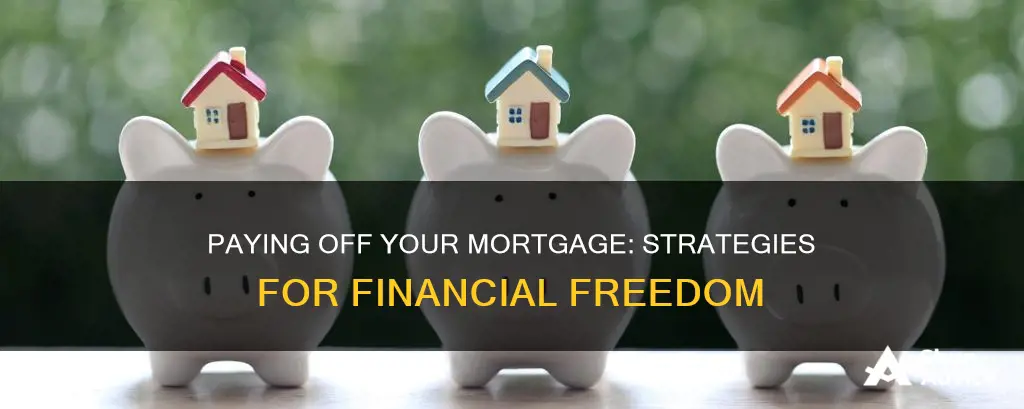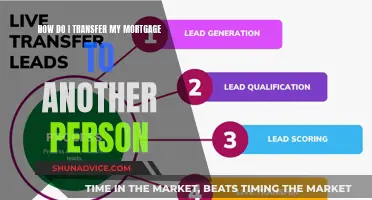
Paying off your mortgage is a significant milestone and a great financial goal to set for yourself. Not only does it give you the freedom of being debt-free, but it also helps you build wealth. While it is a common goal for many, it can be challenging to figure out the best way to achieve it. This guide will provide you with strategies and tips to help you pay off your mortgage faster and achieve financial stability. From budgeting and extra payments to understanding the relevant documentation, you'll be equipped with the knowledge to tackle your mortgage head-on.
| Characteristics | Values |
|---|---|
| Benefits of paying off mortgage early | Build equity, save money, handle short-term debts, bolster financial stability, endure turbulent housing market conditions |
| Budgeting | Write down income, list expenses, subtract expenses from income, track spending |
| Payment strategies | Make extra payments, round up payments, increase payment by a dollar each month, send windfalls to mortgage company, pay more frequently |
| Prepayment penalties | May be charged for paying off mortgage early, check with lender |
| Payment application | Ensure extra payments are applied to principal, not interest |
| Documents received | Canceled promissory note, loan payoff letter, deed of reconveyance, escrow funds, property deed, certificate of satisfaction, final mortgage statement |
| Credit score impact | Credit utilization ratio may lower, credit mix and average age of accounts may change |
What You'll Learn

Budgeting and saving
Budgeting
Start by creating a monthly budget if you don't already have one. List your sources of income and all your expenses, ensuring that your expenses do not exceed your income. Track your spending throughout the month to make sure you are adhering to your budget.
Examine your budget for areas where you can cut back. Groceries, for instance, can be a significant expense, so consider shopping sales and buying in-season produce to reduce costs. Eating out can also add up, so reducing the frequency of dining out may help lower your spending.
Saving
Once you have a budget in place, look for ways to save more. You can apply the dollar-a-month strategy, where you increase your monthly payments by a small amount. For example, if your mortgage payment is $900 per month, you can round it up to $901 and then $902 the following month, and so on. This approach is feasible if your income increases over time, even if it's by a small amount.
Another strategy is to pay 1/12 extra each month. For instance, paying $975 on a $900 mortgage will accumulate to an extra payment by the end of the year, helping to reduce the term of your mortgage.
If you receive any windfalls, such as a work bonus, tax refund, or inheritance, consider putting that extra money towards your mortgage. Making lump-sum contributions can help you chip away at the principal balance.
Additionally, if your lender does not charge a penalty for early repayment, you can make extra payments towards the principal balance of your loan. Ensure that you specify that you want these extra funds to go towards the principal and not towards the following month's payment. By paying extra towards the principal, you can reduce the interest you'll pay over the life of your mortgage.
Remember to always check with your lender about any fees or restrictions associated with extra payments or changes to your payment schedule.
Making Woolwich Mortgage Overpayments: A Step-by-Step Guide
You may want to see also

Making extra payments
Budgeting: Review your budget and see if there are any areas where you can cut back, such as groceries or eating out. Free up some money each month and put it towards your mortgage. You can also try to make small increases in your monthly payments over time. For example, if your mortgage payment is $900, consider paying $901 the second month, $902 the third month, and so on. This gradual increase can help you pay off your mortgage faster without a significant impact on your monthly budget.
Rounding up: When budgeting for your mortgage payment, round up to the next highest $100 amount. For instance, instead of paying $743, round up to $800, or pay $900 instead of $860. This strategy can help you reduce the term of your mortgage significantly.
Lump-sum contributions: If you can't make larger or more frequent payments, consider making one-off lump-sum contributions. Use any unexpected windfalls, such as work bonuses, tax refunds, or inheritances, and put them directly towards your mortgage principal.
Frequency of payments: Instead of making 12 monthly payments, you can make half-payments every two weeks. Since there are 52 weeks in a year, this adds up to one full extra month's payment towards your principal each year.
It's important to note that before making extra payments, you should check with your lender to see if there are any prepayment penalties or restrictions on when they accept extra payments. Additionally, indicate that you want the extra funds to go towards the principal balance, not the following month's payment, to maximize your savings.
Making Mortgage Overpayments: A Guide to Getting Started
You may want to see also

Prepayment penalties
There are two types of prepayment penalties: soft and hard. A soft prepayment penalty applies in fewer situations than a hard prepayment penalty. A soft penalty may be triggered if you refinance your loan or pay off a large chunk of your mortgage within a calendar year. A hard prepayment penalty can be triggered by several different situations, such as selling your home or making extra payments toward your principal that amount to more than 20% of your loan balance in a year.
The cost of prepayment penalties varies depending on the lender and the loan. Some common models used by lenders to determine the cost include:
- A percentage of the remaining loan balance, such as 2% of the outstanding principal if paid off within the first 2-3 years of the loan term.
- A lender-specified number of months' interest, such as 6 months.
- A fixed amount, such as a $3000 flat fee for paying off a loan within the first year (although this model is not commonly used for mortgages).
- A sliding scale based on mortgage length, which is the most common model. For example, a sequential 2/1 prepayment penalty over the first 2 years of a loan means that if the mortgage is paid off during the first year, the penalty is 2% of the outstanding principal balance.
Understanding Mortgage Debt: Strategies for Homeowners
You may want to see also

Building equity
Making regular mortgage payments is the foundation of building equity. Each payment reduces your outstanding loan balance, gradually increasing your ownership stake in the property. Initially, a large portion of your monthly payments goes towards interest, but over time, more of your payment will be applied to the principal amount, thus increasing your equity.
One effective strategy to build equity faster is to make extra mortgage payments. You can pay a little extra each month or make lump-sum contributions. By paying more than your required monthly amount, you can significantly reduce the life of your loan and decrease the amount of interest paid over time. However, it is important to inform your lender that you want the extra funds to go towards the principal amount and not future monthly payments.
Another way to build equity is by making strategic home improvements that enhance your home's functionality and appeal, such as updating your kitchen or living room. These improvements can increase the value of your home, thereby increasing your equity. It is advisable to focus on upgrades that align with current market trends and neighborhood standards to ensure a strong return on investment.
Additionally, a larger down payment when purchasing your home can significantly boost your equity from the start. A bigger down payment means you start off with more home equity and a lower mortgage balance. It can also help you avoid private mortgage insurance (PMI), making your monthly payments more manageable.
Transferring Your Mortgage: Navigating Away from Selene
You may want to see also

Investing instead
Interest rates
If your mortgage has a high-interest rate, it may be a good idea to pay it off early. However, if your interest rate is low (4.5% or lower), you may be better off investing your money. This is because the rate of return on your investments may be higher than the interest on your mortgage. Over time, compound interest means that the money you invest will grow and be worth more.
Risk tolerance
Paying off your mortgage is generally considered a safer option, as it is predictable and you know exactly how much you are saving. Investing, on the other hand, comes with a certain level of risk, as markets fluctuate. However, the average annual rate of return for stocks is 8%, so investing can potentially give you higher returns than paying off your mortgage early.
Retirement savings
If you are nearing retirement, it is important to consider your retirement savings. While some people are uncomfortable with the idea of retiring while still in debt, it is not necessarily a good idea to sacrifice your retirement savings to pay off your mortgage early. By investing your money instead of paying off your mortgage, you can grow your retirement fund and benefit from compound interest.
Other debts
If you have other debts, such as credit card debt or personal loans, it is generally a good idea to focus on paying these off first. These types of debts often come with high-interest rates, so by paying them off first, you can save money which you can then put towards your mortgage, investments, or both.
Peace of mind
For some people, the peace of mind that comes with owning their home outright is priceless. If being debt-free is one of your financial goals, then paying off your mortgage early may be the right choice for you.
Ultimately, the decision to invest or pay off your mortgage early depends on your individual financial circumstances and goals. It is a good idea to consult a financial advisor to help you make the best decision for your situation.
Making Mortgage Payments: Wells Fargo Guide
You may want to see also
Frequently asked questions
Paying off your mortgage is a major milestone and there are certain steps to follow. You can typically pay your mortgage off early, but you may have to pay a prepayment penalty. Making extra payments on your mortgage will help you pay off your mortgage faster.
There are several ways to pay off your mortgage faster. You can make extra mortgage payments, pay 1/12 extra each month, or round up to the next highest $100 amount when budgeting for your mortgage payment.
Paying off your mortgage early can help you save money, build equity, and improve your financial stability. It can also help you handle any short-term debts and give you peace of mind.
It's important to check with your lender about any fees or penalties for early repayment. Some companies only accept extra payments at specific times or may charge prepayment penalties.
There are several documents you will need when paying off your mortgage, including a loan payoff letter, deed of reconveyance, escrow funds, property deed, and a certificate of satisfaction.







